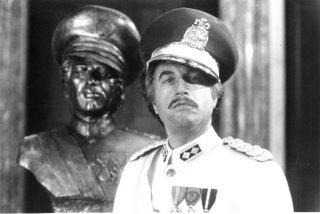Moon Over Parador
I've mentioned before that a detour through Latin America is often a means to approach the question of governance. I've also discussed the way in which performativity seems to be at the core of Hollywood's Latin America.
 Moon Over Parador combines these two concerns: it depicts a US actor, Jack Noah (played by Richard Dreyfuss), who finds himself playing the role of his life standing in as dictator of a Latin American banana republic.
Moon Over Parador combines these two concerns: it depicts a US actor, Jack Noah (played by Richard Dreyfuss), who finds himself playing the role of his life standing in as dictator of a Latin American banana republic.
Naturally enough, Noah's act turns out to be more convincing than that of the real dictator whose place he takes. Equally predictably, Noah also comes to take his role increasingly seriously, coming up with policies that will materially improve the plight of his oppressed people.
Not that the notion of an actor as president is so very novel: within Hollywood, it can be dated at least as far back as The Magnificent Fraud (which this movie essentially remakes); similar substitutions occur in Mark Twain's The Prince and the Pauper, Anthony Hope's The Prisoner of Zenda, Charlie Chaplin's The Great Dictator, or, more recently, Ivan Reitman's Dave. Outside of Hollywood, and in 1988 when Moon Over Parador came out, there was of course Ronald Reagan.
The film even nods towards Reagan when Noah employs the Gipper's characteristic trick of pretending not to hear press queries by gesturing that their questions are drowned out by the roar of a helicopter's rotors. It also alludes to Reagan's then-current policy towards Latin America in its portrayal of a CIA agent, Ralph, whose mission is to ensure that the Republic of Parador is not engulfed by encroaching Communist guerrillas.
Meanwhile, Sonia Braga's role as the dictator's somewhat disreputable mistress, Madonna, is more than a little reminiscent of Evita Perón. And indeed Noah, as he gets into his role and apparently subverts it by tempering autocracy with liberalism, in fact increasingly comes to resemble a populist leader such as Juan Perón or Getulio Vargas.
This layering of references (and there are others, deliberate or otherwise, such as the echoes of Casablanca and the citations from Man of La Mancha) establish that power is performed effectively only by its imitation of other instances of power. Noah learns to rule not by learning anything about the political or social situation of Parador, but by following models drawn from previous representations of power. It's significant that the dictator's name is "Simms": dictatorship is shown here to consist in the art of (dis)simulation.
 There is no original. Convincing Noah that he must play the dictator's part, chief of police Roberto Strausmann (Raul Julia) points out that "Noah," too, is no more than an act, a performance: "Isn't your real name Noah Blumberg? And haven't you assumed a totally new identity?"
There is no original. Convincing Noah that he must play the dictator's part, chief of police Roberto Strausmann (Raul Julia) points out that "Noah," too, is no more than an act, a performance: "Isn't your real name Noah Blumberg? And haven't you assumed a totally new identity?"
What's more, the previous dictator, whose place Noah assumes, wore a wig and make-up, and is described as "Parador's greatest actor." Power is an act, a sham, a matter of smoke and mirrors, that is parasitic on previous shamshows that stretch back to infinity.
But the only thing, the movie suggests, that can overturn power's performativity is yet another simulation. Though the guerrillas might otherwise be imagined to be the "real" against which this imaginary dictatorship is posed, in the end it is only Hollywood that can rescue Noah from his predicament as an actor whose acting is unrecognized, taken to be real. For the special effects guy from a visiting film crew arranges the dictator's fake assassination, so that Noah can smuggle himself away, out of the country and back to his former life as jobbing Broadway thespian.
And retelling his story in New York, Noah finds that his fellow actors find his tale simply too unlikely. The problem with power, Moon Over Parador suggests, is that it provokes only either credulousness or incredulity. We should be prepared, rather, to take its unseriousness seriously. Which is also a pretty good rule of thumb with which to approach light-hearted comedies such as this one.
 Moon Over Parador combines these two concerns: it depicts a US actor, Jack Noah (played by Richard Dreyfuss), who finds himself playing the role of his life standing in as dictator of a Latin American banana republic.
Moon Over Parador combines these two concerns: it depicts a US actor, Jack Noah (played by Richard Dreyfuss), who finds himself playing the role of his life standing in as dictator of a Latin American banana republic. Naturally enough, Noah's act turns out to be more convincing than that of the real dictator whose place he takes. Equally predictably, Noah also comes to take his role increasingly seriously, coming up with policies that will materially improve the plight of his oppressed people.
Not that the notion of an actor as president is so very novel: within Hollywood, it can be dated at least as far back as The Magnificent Fraud (which this movie essentially remakes); similar substitutions occur in Mark Twain's The Prince and the Pauper, Anthony Hope's The Prisoner of Zenda, Charlie Chaplin's The Great Dictator, or, more recently, Ivan Reitman's Dave. Outside of Hollywood, and in 1988 when Moon Over Parador came out, there was of course Ronald Reagan.
The film even nods towards Reagan when Noah employs the Gipper's characteristic trick of pretending not to hear press queries by gesturing that their questions are drowned out by the roar of a helicopter's rotors. It also alludes to Reagan's then-current policy towards Latin America in its portrayal of a CIA agent, Ralph, whose mission is to ensure that the Republic of Parador is not engulfed by encroaching Communist guerrillas.
Meanwhile, Sonia Braga's role as the dictator's somewhat disreputable mistress, Madonna, is more than a little reminiscent of Evita Perón. And indeed Noah, as he gets into his role and apparently subverts it by tempering autocracy with liberalism, in fact increasingly comes to resemble a populist leader such as Juan Perón or Getulio Vargas.
This layering of references (and there are others, deliberate or otherwise, such as the echoes of Casablanca and the citations from Man of La Mancha) establish that power is performed effectively only by its imitation of other instances of power. Noah learns to rule not by learning anything about the political or social situation of Parador, but by following models drawn from previous representations of power. It's significant that the dictator's name is "Simms": dictatorship is shown here to consist in the art of (dis)simulation.
 There is no original. Convincing Noah that he must play the dictator's part, chief of police Roberto Strausmann (Raul Julia) points out that "Noah," too, is no more than an act, a performance: "Isn't your real name Noah Blumberg? And haven't you assumed a totally new identity?"
There is no original. Convincing Noah that he must play the dictator's part, chief of police Roberto Strausmann (Raul Julia) points out that "Noah," too, is no more than an act, a performance: "Isn't your real name Noah Blumberg? And haven't you assumed a totally new identity?" What's more, the previous dictator, whose place Noah assumes, wore a wig and make-up, and is described as "Parador's greatest actor." Power is an act, a sham, a matter of smoke and mirrors, that is parasitic on previous shamshows that stretch back to infinity.
But the only thing, the movie suggests, that can overturn power's performativity is yet another simulation. Though the guerrillas might otherwise be imagined to be the "real" against which this imaginary dictatorship is posed, in the end it is only Hollywood that can rescue Noah from his predicament as an actor whose acting is unrecognized, taken to be real. For the special effects guy from a visiting film crew arranges the dictator's fake assassination, so that Noah can smuggle himself away, out of the country and back to his former life as jobbing Broadway thespian.
And retelling his story in New York, Noah finds that his fellow actors find his tale simply too unlikely. The problem with power, Moon Over Parador suggests, is that it provokes only either credulousness or incredulity. We should be prepared, rather, to take its unseriousness seriously. Which is also a pretty good rule of thumb with which to approach light-hearted comedies such as this one.
Labels: performativity, power
